In Islam, protection from unseen harm, especially the evil eye (nazar-e-bad), is a deeply rooted spiritual practice supported by the Qur’an and the authentic Sunnah. The concept of nazar (نَظَر), often referred to as “evil gaze” or “bad nazar,” is the harmful effect that arises from envy, jealousy, or excessive admiration. The Prophet Muhammad ﷺ confirmed its reality when he said:
الْعَيْنُ حَقٌّ
Transliteration: Al-ʿayn ḥaqq
Translation: “The evil eye is real.” (Sahih al-Bukhari 5740)
This short yet profound statement reminds every believer that nazar is not a superstition, but a genuine spiritual ailment that can afflict one’s health, success, beauty, family, or sustenance by Allah’s decree. Hence, it becomes essential for every Muslim to seek divine protection through authentic duas for nazar and Qur’anic supplications prescribed by the Prophet ﷺ himself.
Allah ﷻ, in His infinite mercy, has provided in the Qur’an special ayats (verses) and duas for safety, including Surah Al-Falaq, Surah An-Nas, and the well-known A‘udhu bikalimatillahi at-tammah, often regarded as the best dua for nazar and evil eye protection. These powerful words not only guard against spiritual harm but also bring peace of mind, emotional comfort, and divine reassurance to the believer.
In today’s world, where envy can even spread through social media and constant comparison, understanding and practicing the duas for protection from evil eye is more important than ever. Whether you seek the dua for black nazar, bad nazar dua in Quran, or a dua for nazar in Islam for yourself, your children, or your home, this guide will walk you through every authentic method backed by the Qur’an, Hadith, and Prophetic tradition.
By the end of this article, you’ll not only know the best dua for nazar bad and the ayat for nazar e bad, but also how to practically incorporate these powerful supplications into your daily life for ongoing spiritual protection, tranquility, and closeness to Allah.
Understanding Nazar (Evil Eye) in Islam
The concept of nazar (evil eye) is one of the unseen realities acknowledged in Islam, carrying both spiritual and psychological significance. It refers to the harm caused by envy, jealousy, or an admiring gaze, whether intentional or not, which can affect a person’s health, wealth, beauty, or peace. The Qur’an and Hadith confirm its reality, guiding believers to seek refuge in Allah through authentic duas for nazar and protection from evil eye. Understanding what nazar truly is helps Muslims guard themselves the right way i.e. with faith, remembrance, and reliance on Allah rather than superstition.
What is nazar in Islam?
The word nazar (نَظَر) literally means “looking” or “gaze.” Evil eye refers to a harmful effect resulting from envy or jealousy in someone’s gaze, whether intentional or unintentional. The Prophet Muhammad ﷺ affirmed its reality:
Arabic: الْعَيْنُ حَقٌّ
Transliteration: Al-ʿayn ḥaqq
Translation: “The evil eye is real (a fact).”
Thus, recognizing nazar is part of Islamic belief, but the key is not to become overly superstitious; rather, to turn to Allah for protection.
Hadith basis for ruqyah and protection
Aisha (may Allah be pleased with her) said:
Arabic: أَمَرَ النَّبِيُّ ﷺ أَنْ نَسْتَرْقِيَ مِنَ الْعَيْنِ
Transliteration: Amara an-nabiyyu ﷺ an nastarqī min al-ʿayn
Translation: “The Prophet ﷺ commanded that we seek ruqyah from the evil eye.”
Also, the Prophet ﷺ said:
Arabic: لا رُقْيَةَ إِلا مِنْ عَيْنٍ أَوْ حُمَّةٍ
Transliteration: Lā ruqyah illā min ʿaynin aw ḥumma
Translation: “There is no ruqyah except for the evil eye or a scorpion sting.”
These hadiths justify using dua for nazar / ruqyah for nazar as legitimate Islamic practice.
Nazar bad ki dua in quran
While the Quran does not say “evil eye” often in those exact terms, there are verses that instruct us to seek refuge from evil and envy:
Surah Al-Falaq (113):
Arabic: قُلْ أَعُوذُ بِرَبِّ الْفَلَقِ * مِن شَرِّ مَا خَلَقَ * وَمِن شَرِّ غَاسِقٍ إِذَا وَقَبَ * وَمِن شَرِّ النَّفَّاثَاتِ فِي الْعُقَدِ * وَمِن شَرِّ حَاسِدٍ إِذَا حَسَدَ
Transliteration: Qul aʿūdhu birabbi al-falaq / min sharri mā khalaq / wa min sharri ghāsiqin idhā waqab / wa min sharri an-naffāthāti fil-ʿuqad / wa min sharri ḥāsidin idhā ḥasad
Translation: “Say, ‘I seek refuge in the Lord of daybreak / From the evil of what He created / And from the evil of darkness when it settles / And from the evil of the blowers in knots / And from the evil of an envier when he envies.’”
Notice the phrase “من شر حاسد إذا حسد” from the evil of one who envies correlates with “bad nazar.”
Another relevant verse:
“And from the evil of an envier when he envies.” (Same as above)
Many articles note this verse as an ayat for nazar e bad. These Qur’anic passages form a core part of our spiritual refuge.
Best Dua for Nazar & Protection from Evil Eye
In this section, we present and explain the most authentic and powerful duas for protection from evil eye and nazar.
Dua No 1
Most Powerful dua for nazar
A‘udhu bi kalimatillah al-tammat
This is the most frequent and best dua mentioned in tradition:
Arabic: أَعُوذُ بِكَلِمَاتِ اللَّهِ التَّامَّةِ مِنْ شَرِّ مَا خَلَقَ
Transliteration: A‘udhu bikalimatillahi at-tammah min sharri ma khalaq
Translation: “I seek refuge in the perfect words of Allah from the evil of what He has created.”
This is often used as a daily dua for nazar, or best dua for nazar. Some extend it to protect children:
Arabic: أُعِيذُكُمَا بِكَلِمَاتِ اللَّهِ التَّامَّةِ مِنْ كُلِّ شَيْطَانٍ وَهَامَّةٍ وَمِنْ كُلِّ عَيْنٍ لَامَّةٍ
Transliteration: U‘īdhukumā bikalimātillāh at-tāmmah min kulli shayṭānin wa hāmmatin, wa min kulli ʿaynin lāmmatin
Translation: “I seek refuge for you both (e.g. male/female) in the perfect words of Allah from every devil and every poisonous creature, and from every evil, harmful eye.”
This is especially used for children or loved ones.
Dua No 2
Surah Al-Falaq & Surah An-Nās (Al-Mu’awwidhatayn)
Surah Al Falaq in Arabic:
بِسْمِ اللَّهِ الرَّحْمَـٰنِ الرَّحِيمِ
قُلْ أَعُوذُ بِرَبِّ الْفَلَقِ
مِن شَرِّ مَا خَلَقَ
وَمِن شَرِّ غَاسِقٍ إِذَا وَقَبَ
وَمِن شَرِّ النَّفَّاثَاتِ فِي الْعُقَدِ
وَمِن شَرِّ حَاسِدٍ إِذَا حَسَدَ
Surah An Naas
بِسْمِ اللَّهِ الرَّحْمَـٰنِ الرَّحِيمِ
قُلْ أَعُوذُ بِرَبِّ النَّاسِ
مَلِكِ النَّاسِ
إِلَـٰهِ النَّاسِ
مِن شَرِّ الْوَسْوَاسِ الْخَنَّاسِ
الَّذِي يُوَسْوِسُ فِي صُدُورِ النَّاسِ
مِنَ الْجِنَّةِ وَالنَّاسِ
Recite both Quranic surahs three times (morning & evening) for protection.
These contain ayat for nazar e bad via seeking refuge from envy. This dua is best for protecting your property, shop, house, or business from nazar.
Dua No 3
Ayat al-Kursī (Quran 2:255)
This dua from quran is best for protection agains evil eye, this verse is extremely powerful for protection:
Arabic:
اللَّهُ لَا إِلَٰهَ إِلَّا هُوَ الْحَيُّ الْقَيُّومُ ۚ
لَا تَأْخُذُهُ سِنَةٌ وَلَا نَوْمٌ ۚ
لَهُ مَا فِي السَّمَاوَاتِ وَمَا فِي الْأَرْضِ ۗ
مَن ذَا الَّذِي يَشْفَعُ عِندَهُ إِلَّا بِإِذْنِهِ ۚ
يَعْلَمُ مَا بَيْنَ أَيْدِيهِمْ وَمَا خَلْفَهُمْ ۖ
وَلَا يُحِيطُونَ بِشَيْءٍ مِّنْ عِلْمِهِ إِلَّا بِمَا شَاءَ ۚ
وَسِعَ كُرْسِيُّهُ السَّمَاوَاتِ وَالْأَرْضَ ۖ
وَلَا يَئُودُهُ حِفْظُهُمَا ۚ
وَهُوَ الْعَلِيُّ الْعَظِيمُ
Dua No 4
Ruqyah formula from hadith
The Prophet ﷺ used to say when coming under harm:
Arabic: بسم الله أرْقيكَ من كل شيءٍ يؤذيك من شرّ كل نفسٍ أو عينٍ حاسدٍ، الله يشفيك
Transliteration: Bismillāhi arqīka min kulli shay’in yu’dhīka, min sharri kulli nafsin aw ʿaynin ḥāsidin, Allāhu yashfīk
Translation: “In the Name of Allah I recite over you, from everything which harms you, from the evil of every soul or from the evil eye of the envier. May Allah heal you.”
This is often used when someone is ill, afflicted, or suspected to have been affected by nazar.
Dua No 5
Another protective prayer
Arabic: رَبِّ أَعُوذُ بِكَ مِنْ هَمَزَاتِ الشَّيَاطِينِ وَأَعُوذُ بِكَ رَبِّ أَنْ يَحْضُرُونِ
Transliteration: Rabbi a‘ūdhu bika min hamazātish-shayāṭīn wa a‘ūdhu bika rabbi an yaḥḍurūn
Translation: “My Lord, I seek refuge in You from the whisperings of the devils, and I seek refuge in You, my Lord, lest they come near me.” (Quran 23:97-98)
These prayers form a comprehensive shield when combined.
Recommended recitation frequency
Below is a recommendation to recite various dua for nazar e bad:
- Recite A‘udhu bikalimatillah at-tammah three times in the morning & evening.
- After every ṣalah (prayer), recite Ayat al-Kursi.
- Recite Al-Falaq & An-Nas three times morning & evening.
- For children or vulnerable ones: recite U‘idhukuma… over them.
- When feeling affected: recite the ruqyah formula Bismillahi arqika … over oneself or the affected person.
- Maintain sincere faith (iman), the protection works by Allah’s will.
Why These Duas Work
These duas for nazar and protection from evil eye work because they are rooted in the divine words of Allah and the authentic teachings of the Prophet ﷺ. When recited with sincerity and firm belief, they create a spiritual shield that safeguards one’s body, mind, and soul from envy and unseen harm. Practically, they also nurture peace, faith, and inner strength, reminding believers that ultimate protection lies only with Allah ﷻ.
Theological reasoning
- Allah is the ultimate Protector (Al-Muḥīṭ, Al-Wali, Al-Hafiz); we seek His refuge.
- The Qur’an teaches that the damage from envying is real: “And from the evil of an envier when he envies.” (Surah Al-Falaq)
- The Prophet ﷺ taught that ruqyah and supplication are permissible for the evil eye (hadith above).
- The duʿaʾ “A‘udhu bikalimatillah at-tammah” is considered “perfect words” (kalimāt tammah), elevating its spiritual efficacy.
Practical benefits
- Regular recitation increases awareness of Allah’s protection and reduces fear.
- It trains the believer to respond to harm spiritually rather than by superstition.
- These duas are easy to memorize and recite anytime (when leaving home, when concerned, for children, etc.).
- When combining with good deeds (charity, kindness, avoiding envy), the spiritual shield strengthens.
How to Use These Duas
- Morning & evening routine: allocate a few minutes to recite protective duas (A‘udhu, Al-Falaq, An-Nas, Ayat al-Kursi).
- Use over children: after Fajr or before sleep, recite U‘idhukuma… over your children or loved ones.
- When seeing something praiseworthy: say Ma shaʾ Allah or BarakAllah laka, to prevent envy.
- If someone is affected (suspected nazar): perform ruqyah, recite Bismillahi arqika … over them, blow gently, wash, etc.
- Avoid arrogance & envy: purify intention, never say “I have no envy.” Instead, guard heart.
Brief Template for a Protection Routine
Here’s a simple daily routine you can adopt:
| Duas for nazar e bad and protection of evil eye in Islam | ||
| Time | What to Recite / Do | Purpose / Notes |
| After Fajr | Ayat al-Kursi | Barrier of protection |
| Morning | A‘udhu bikalimatillah at-tammah (3×) + Al-Falaq & An-Nas (3×) | Shield during daytime |
| Before leaving home | Recite A‘udhu duʿa | Protection while outside |
| Evening | A‘udhu + Al-Falaq & An-Nas (3×) | Night protection |
| Before sleep | Recite over children: U‘idhukuma… | Protect them while asleep |
| If feeling afflicted | Ruqyah formula: Bismillahi arqika… | Remove effect of nazar |
Repeat consistently, with sincerity and trust in Allah.
The Power of Dua and Faith Against Nazar-e-Bad and Evil Eye
True protection from bad nazar or nazar-e-bad does not lie in amulets, charms, or cultural superstitions, but in the remembrance of Allah and adherence to His guidance. When a believer recites these Qur’anic ayats for nazar with sincerity, humility, and consistency i.e. morning and evening, they invite Allah’s mercy and establish a fortress of light around their soul, family, and home.
In a world filled with jealousy, competition, and the constant display of blessings, every Muslim should make it a daily habit to recite these powerful duas for nazar and evil eye protection. Through these supplications, we not only protect ourselves from harm but also strengthen our relationship with Allah the ultimate Protector and Guardian.
May Allah ﷻ protect us all from every form of envy, evil eye, and hidden harm, and may He bless our lives with peace, contentment, and divine protection. Ameen!
Frequently Asked Questions (FAQs)
What is the best dua for nazar in Islam?
The most widely-reported and powerful is:
Arabic: أَعُوذُ بِكَلِمَاتِ اللَّهِ التَّامَّةِ مِنْ شَرِّ مَا خَلَقَ
Transliteration: A‘udhu bikalimatillahi at-tammah min sharri ma khalaq
Translation: “I seek refuge in the perfect words of Allah from the evil of what He has created.”
This is often used for daily protection against black nazar / evil eye.
Is there a specific dua for black nazar / bad nazar?
The same duʿā above covers black nazar or bad nazar. Also, the verse “مِن شَرِّ حَاسِدٍ إِذَا حَسَدَ” (“from the evil of the envier when he envies”) in Surah Al-Falaq is directly relevant. Reciting Al-Falaq & An-Nas and Ayat al-Kursi also helps.
How do I know if someone has given me the evil eye (nazar)?
Signs may include sudden illness, unusual weakness, persistent misfortune, a sense of heaviness. However, Islam cautions not to jump to superstition. Always first seek medical / material cause, while simultaneously making protective dua and ruqyah.
How to remove nazar (evil eye) in Islam?
Answer: Use ruqyah (recite over the person: Bismillahi arqika …), recite Ayat al-Kursi, Al-Falaq & An-Nas, dua for nazar, blow gently, wash, and increase salah, dhikr, charity. Also, invite the person who cast the nazar (if possible) to wash, and use their water over you.
Should I recite these duas daily or only when I feel affected?
Ideally, make them part of your daily routine (morning & evening), so your spiritual shield is always up. But when feeling vulnerable or after noticing signs, reciting them is especially recommended.
Are there limitations or cautions?
Don’t mix these practices with shirk (i.e. attributing independent power to other than Allah). Don’t overdo superstitious rituals not supported by Quran/Sunnah and always rely on Allah; dua is a means, not magic. Seek medical help when needed as spiritual treatment complements physical healing.

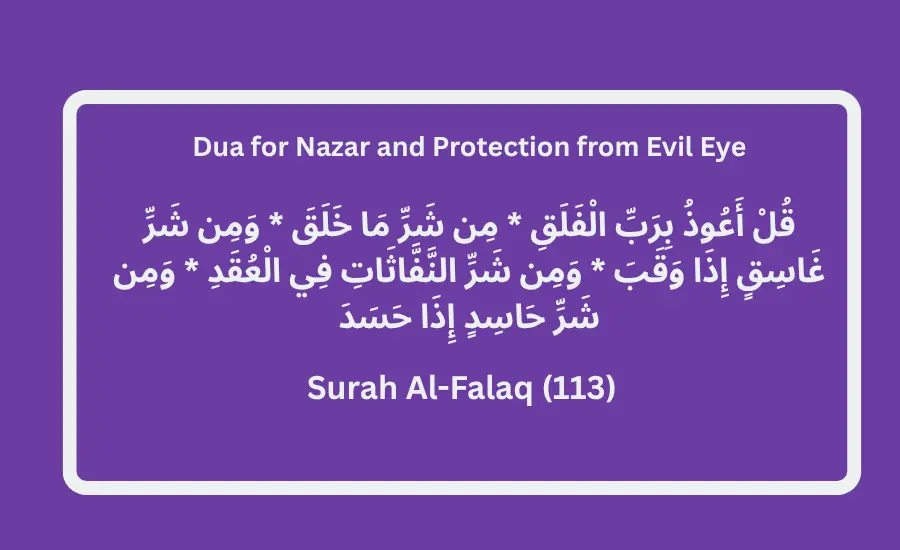
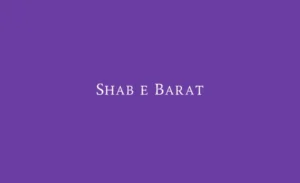
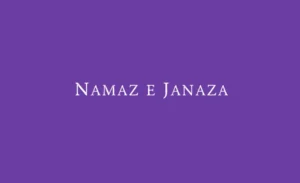
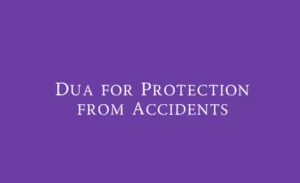
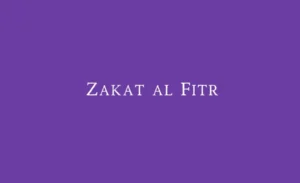

2 Responses
Fantastic read!
Great delivery. Solid arguments. Keep up the amazing work.